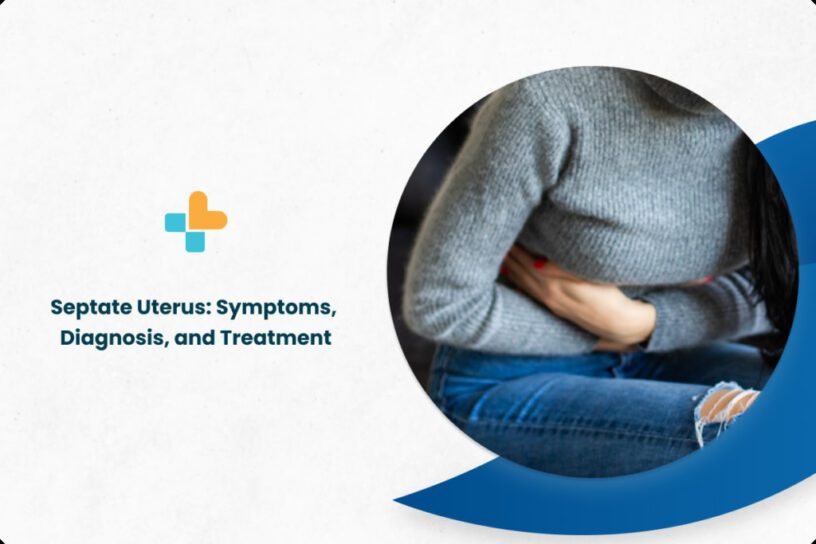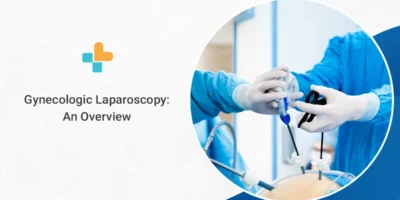Uterus holds a vital position in the female reproductive system. It is responsible for important phenomena such as menstruation, gestation, implantation, and pregnancy. Now, a “septate” uterus is a form of uterine defect. In case you thought of “sepsis”, this has nothing to do with that condition.
If you have a lot of questions about septate uterus, you’ve come to the correct place. Read on to learn more about the condition and septate uterus treatment.
What Is a Septate Uterus?
A uterus that has a septum dividing it into two is said to be septate. It is a congenital defect i.e. the anomaly occurred at the fetal stage of the female. While the uterus looks normal from the outside, a septum might be separating it into different cavities from within. Because of how frequently it occurs, some institutions classify it as a sort of normalcy.
Despite the fact that the illness is neither harmful nor hazardous in itself, it can affect pregnancy and therefore is believed to raise the chance of miscarriage. In a nutshell, a septate uterus and pregnancy do not go well together. Having a septate uterus blocks the proper blood supply to the uterine walls, making implantation very difficult. And this is why septate uterus treatment in pregnancy becomes more necessary.
A uterus that has a septum dividing it into two is said to be septate. It is a congenital defect i.e. the anomaly occurred at the fetal stage of the female. While the uterus looks normal from the outside, a septum might be separating it into different cavities from within. Because of how frequently it occurs, some institutions classify it as a sort of normalcy.
Despite the fact that the illness is neither harmful nor hazardous in itself, it can affect pregnancy and therefore is believed to raise the chance of miscarriage. In a nutshell, a septate uterus and pregnancy do not go well together. Having a septate uterus blocks the proper blood supply to the uterine walls, making implantation very difficult. And this is why septate uterus treatment in pregnancy becomes more necessary.
Amongst all uterine abnormalities, the septate uterus makes up 55% of the cases. Almost 0.2-2.3% of women of reproductive age are diagnosed with it. The statistics can be significantly higher since many cases go undiagnosed and unnoticed.
The following are hazards connected with eliminating the uterine septum:
- Perforation of the uterus.
- Damage or injury to the cervix.
- Excess bleeding.
- Infections.
- Deep scarring
What Are the Causes?
It is a genetic abnormality, and that’s all known about the condition. The uterus originates in the female fetus as two tubes that ultimately unite to create one chamber in the middle of the body. However, the problem arises when the tubes don’t fuse in the end. Instead, they form a tissue membrane that acts like a septum and divides the uterus into two chambers. So this is considered one of the major septate uterus causes.
Types
Septate uterus can be of mainly two types:
- Partially septate uterus: The septum is limited to the uterus; doesn’t extend to the cervix.
- Completely septate uterus: In this case, the septum extends up to the cervix, and sometimes to the vagina.
Symptoms of Septate Uterus
Generally, the condition is asymptomatic. Once your medical doctor begins to investigate the root cause of your repeated miscarriages, only then do you become notified of your ailment. However, some of the potential septate uterus symptoms are:
- Recurring pain in the pelvic region.
- Difficulty in menstruation.
- Not getting pregnant; repeated miscarriages.
How Common Is the Septate Uterus?
Amongst all uterine abnormalities, the septate uterus makes up 55% of the cases. Almost 0.2-2.3% of women of reproductive age are diagnosed with it. The statistics can be significantly higher since many cases go undiagnosed and unnoticed.
Diagnosis
Generally, the septum is a very thin tissue membrane, not properly visible to the naked eye. Thus medical imaging techniques are used to visualize and begin the septate uterus treatment. The commonly used methods are:
- Hysteroscopy
- 3D or 2D ultrasonography.
- MRI scan
A hysteroscopy is a technique that uses a hysteroscope, a small, flexible tube, to look into the uterus.
In the case of ultrasound, a 3D ultrasound is preferred over a 2D one due to the more detailed images obtained. Often a saline fluid is injected inside the uterine cavity before scanning, to increase the precision of the results. MRI is also an alternative, however, it is quite more expensive than the other options.
Treatment for Septate Uterus
Surgical removal of the septum is the most common mode of septate uterus treatment. The surgery doesn’t involve much risk and the patient is often discharged on the same day. The surgeon inserts a scope on a tube through the vagina, to enter the uterus and cut off the septum. The septum can be cut with cold scissors, electrical current, or laser, among other methods. All this while, ultrasound is used to monitor the activity and ensure proper removal of the septum. Some side effects may be pain or some bleeding, all of which are manageable.
What Are the Complications of Treating a Septate Uterus?
The following are hazards connected with eliminating the uterine septum:
- Perforation of the uterus.
- Damage or injury to the cervix.
- Excess bleeding.
- Infections.
- Deep scarring
Summing Up
Getting pregnant can be very important to somebody. It isn’t fair to get discouraged due to this condition, since septate uterus treatment is available. Lots of qualified fertility specialists and gynecologists are present at Ayu Health. What are you waiting for? Reach out at 636-610-0800 to know more.
Our Hospital Locations
Gynaecology Surgery Hospitals in Chandigarh | Gynaecology Surgery Hospitals in Bangalore | Gynaecology Surgery Hospitals in Jaipur | Gynaecology Surgery Hospitals in NCR | Gynaecology Surgery Hospitals in Hyderabad
Our Doctors
Gynaecology Surgery Doctors in Chandigarh | Gynaecology Surgery Doctors in Bangalore | Gynaecology Surgery Doctors in Jaipur | Gynaecology Surgery Doctors in NCR | Gynaecology Surgery Doctors in Hyderabad
About the Author

Dr. Nikitha Murthy B.S.
Dr. Nikitha Murthy B.S. is a renowned Gynaecologist currently practicing at Ayu Health, Bangalore.
He is s a Consultant with IVF Access at its Rajajinagar clinic. She has over 6 years of experience. Dr. Nikitha has a post-graduation (MS) in Gynaecology, DNB from the National Board of India, and a Fellowship in Reproductive Medicine. He also has vast experience in Post-Graduation (MS) in Gynaecology and DNB.




